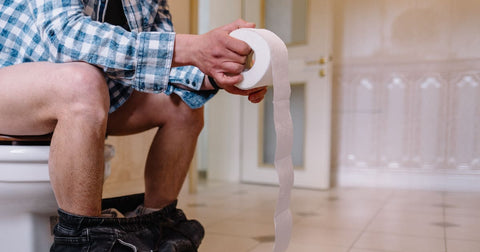Constipation is a common issue that can affect people of all ages. Imagine starting your day feeling bloated, sluggish, and uncomfortable because you haven't had a bowel movement in days. This is a reality for many individuals struggling with constipation, which can significantly impact their daily life and overall health. While there are numerous remedies available, from dietary changes to medications, one often overlooked method is the simple, soothing act of taking a warm bath.

Can a warm bath help relieve constipation? This article explores the science, benefits, and practical application of warm baths for alleviating constipation. By understanding how a warm bath can impact the body, you might find a new, relaxing way to address this uncomfortable issue.
Understanding Constipation
Constipation is defined as having fewer than three bowel movements a week. It often involves the passage of hard, dry stools and can be accompanied by straining, bloating, and a sense of incomplete evacuation. Common symptoms of constipation include:
- Infrequent bowel movements
- Hard or lumpy stools
- Straining during bowel movements
- A feeling that the rectum is blocked
- A sense that not all stool has passed
Causes of Constipation
Constipation can be caused by a variety of factors, which can be broadly categorized into dietary, lifestyle, and medical causes.
- Dietary Factors
- Low Fiber Intake: Fiber adds bulk to the stool and helps it pass through the intestines. A diet lacking in fruits, vegetables, and whole grains can lead to constipation.
- Dehydration: Water is essential for digesting food and moving waste through the intestines. Not drinking enough fluids can result in hard, dry stools that are difficult to pass.
- Lifestyle Factors

- Lack of Physical Activity: Regular exercise helps stimulate intestinal activity. Sedentary lifestyles can slow down the digestive process, leading to constipation.
- Ignoring the Urge to Go: Sometimes, people delay going to the bathroom due to busy schedules or discomfort using public restrooms, which can lead to constipation over time.
- Medical Conditions
- Irritable Bowel Syndrome (IBS): A condition characterized by a mix of constipation and diarrhea.
- Hypothyroidism: An underactive thyroid gland can slow down bodily functions, including digestion, leading to constipation.
- Medications and Supplements
- Pain Relievers: Opioids, in particular, can cause severe constipation.
- Antacids: Some antacids containing calcium or aluminum can contribute to constipation.
- Iron Supplements: High doses of iron can lead to digestive issues, including constipation.
The Science Behind Warm Baths and Constipation Relief
Physiological Effects of Warm Baths
Warm baths are often touted for their relaxing properties, but they also have physiological effects that can aid in relieving constipation. When you immerse yourself in warm water, your body temperature increases, leading to the dilation of blood vessels and improved circulation. This enhanced blood flow can help stimulate the digestive system, promoting bowel movements.
The warmth of the bath also helps to relax muscles throughout the body, including those in the abdomen. Relaxed abdominal muscles can reduce tension and spasms in the intestines, making it easier for stool to pass. Additionally, the soothing effect of warm water can help reduce stress and anxiety, which are known contributors to constipation.
Hydrotherapy and Thermotherapy

Hydrotherapy, the use of water for therapeutic purposes, has been used for centuries to treat various ailments, including digestive issues. Thermotherapy, which involves the application of heat, is a component of hydrotherapy that can be particularly effective for constipation relief.
Heat from a warm bath can stimulate peristalsis, the wave-like contractions that move food through the digestive tract. This stimulation can help get things moving again when constipation has slowed down the digestive process. Moreover, the buoyancy of water supports the body, reducing pressure on the internal organs and allowing for better intestinal function.
Benefits of Using a Warm Bath for Constipation
Relaxation and Stress Reduction
Stress is a significant factor in many cases of constipation. When you're stressed, your body's fight-or-flight response can divert resources away from the digestive system, leading to slower digestion and constipation. A warm bath promotes relaxation, reducing stress levels and helping to restore normal digestive function. The calming effect of warm water can help activate the parasympathetic nervous system, which is responsible for rest and digestion.
Muscle Relaxation
One of the primary benefits of a warm bath is muscle relaxation. The heat from the water helps to relax the muscles in the abdomen and the intestinal walls, which can ease the passage of stool. When these muscles are relaxed, it reduces the likelihood of painful cramps and spasms that often accompany constipation. This muscle relaxation can also help alleviate the discomfort and bloating that frequently occur with constipation.
Hydration Through Skin Absorption
While drinking water is crucial for preventing and relieving constipation, soaking in a warm bath can also contribute to your hydration levels. The skin absorbs water during a bath, which can help maintain overall hydration and support regular bowel movements. Proper hydration is essential for softening stool and promoting easier passage through the intestines.
Other Benefits

- Improved Sleep: A warm bath before bedtime can improve sleep quality, and good sleep is essential for maintaining regular bowel movements.
- Enhanced Mood: The soothing effect of a warm bath can improve mood and reduce anxiety, contributing to overall well-being and better digestive health.
Ideal Bath Temperature
To maximize the benefits of a warm bath for constipation relief, the water temperature should be comfortable but warm enough to promote muscle relaxation. The recommended temperature range is between 92°F (33°C) and 100°F (38°C). This range helps to soothe the muscles without causing discomfort or overheating. It's advisable to soak in the bath for about 15 to 20 minutes, allowing enough time for the warmth to penetrate and relax the abdominal muscles effectively.
Adding Epsom Salts or Essential Oils
Enhancing your warm bath with Epsom salts can further aid in relieving constipation. Epsom salts, or magnesium sulfate, are known for their muscle-relaxing properties. Adding about 2 cups of Epsom salts to your bath can help draw water into the intestines, which can soften stools and promote bowel movements.
Additionally, incorporating essential oils such as lavender, peppermint, or ginger can provide added relaxation and therapeutic benefits. Lavender oil is particularly known for its calming effects, while peppermint and ginger oils can stimulate digestive processes. Add a few drops of these essential oils to the bathwater, ensuring they are well-diluted to avoid skin irritation.
Complementary Techniques
To enhance the constipation-relieving effects of a warm bath, consider incorporating gentle abdominal massage during your soak. Using circular motions, gently massage your abdomen to stimulate the intestines and promote bowel movements. This can be especially effective when combined with the relaxing properties of the warm water.
Incorporating relaxation techniques such as deep breathing or meditation can also be beneficial. Focusing on deep, diaphragmatic breathing helps reduce stress and promotes a state of relaxation, which can positively impact your digestive system. Try taking slow, deep breaths, holding for a few seconds, and then exhaling slowly. This practice can help relax the entire body and support digestive health.
Other Home Remedies and Lifestyle Changes for Constipation
Dietary Adjustments

One of the most effective ways to manage and prevent constipation is through dietary changes. Increasing your fiber intake is crucial, as fiber adds bulk to stools and makes them easier to pass. Aim to consume a variety of high-fiber foods, such as fruits, vegetables, whole grains, and legumes. Foods like apples, pears, berries, broccoli, carrots, oats, and beans are excellent sources of dietary fiber.
Staying hydrated is equally important. Drinking plenty of water helps soften stools and supports overall digestive function. Aim for at least 8 glasses of water a day, and consider incorporating other hydrating fluids like herbal teas and clear soups.
Physical Activity
Regular physical activity is essential for maintaining healthy bowel movements. Exercise helps stimulate the natural contractions of the intestines, aiding in the movement of stools through the digestive tract. Aim for at least 30 minutes of moderate exercise most days of the week. Activities such as walking, jogging, swimming, and yoga can be particularly beneficial for digestive health.
Certain exercises, such as yoga poses that involve twisting the torso, can specifically help with digestion. Poses like the seated twist or the supine twist can massage the intestines and promote bowel movements.
Over-the-Counter Remedies
For occasional constipation, over-the-counter remedies can be useful. Laxatives, stool softeners, and fiber supplements are commonly used options. Laxatives work by stimulating bowel movements, while stool softeners help to make stools easier to pass. Fiber supplements can increase stool bulk and promote regularity.
However, it is essential to use these remedies cautiously and not rely on them for long-term use, as they can lead to dependency and potentially disrupt normal bowel function. If constipation persists, it is crucial to consult a healthcare professional for advice and appropriate treatment.
When to Seek Medical Help
Warning Signs
While home remedies like warm baths can be effective for relieving constipation, it's essential to recognize when you should seek professional medical advice. Persistent constipation that lasts longer than three weeks, despite home treatments, warrants a visit to your healthcare provider. Additionally, certain symptoms may indicate a more serious underlying condition. These include:

- Severe or continuous abdominal pain
- Blood in the stool or rectal bleeding
- Unexplained weight loss
- Persistent vomiting
- Sudden changes in bowel habits, particularly in individuals over 50
These symptoms could signal conditions such as colorectal cancer, bowel obstruction, or inflammatory bowel disease (IBD). Prompt medical evaluation can ensure appropriate diagnosis and treatment, preventing complications and improving outcomes.
Professional Treatment Options
If your constipation persists or is accompanied by any of the warning signs mentioned, consulting a healthcare professional is crucial. Your doctor may recommend various treatments based on the underlying cause and severity of your condition:
- Medications and Therapies: Prescription medications like lubiprostone or linaclotide can help stimulate bowel movements. In some cases, biofeedback therapy may be recommended to retrain the muscles involved in defecation.
- Dietary and Lifestyle Modifications: A healthcare provider might suggest specific dietary changes, such as increasing fiber intake or adopting a particular diet plan, and may recommend integrating more physical activity into your daily routine.
- Diagnostic Tests: To rule out serious conditions, your doctor may order diagnostic tests such as blood tests, colonoscopy, or imaging studies like X-rays or CT scans.
By seeking medical help when necessary, you can ensure that your constipation is managed effectively and any potential complications are addressed promptly.
Frequently Asked Questions
Can a warm bath really help with constipation?
Yes, a warm bath can help relieve constipation by relaxing the muscles in your abdomen and intestines, which can facilitate bowel movements. The warmth increases blood flow and promotes relaxation, potentially easing the passage of stool.
How long should I stay in a warm bath to relieve constipation?
To potentially relieve constipation, you should soak in a warm bath for about 15 to 20 minutes. Ensure the water is comfortably warm but not too hot, to avoid skin irritation or dehydration.
Can adding Epsom salts to the bath improve its effectiveness for constipation?

Yes, adding Epsom salts to your warm bath can enhance its effectiveness. Epsom salts contain magnesium, which can be absorbed through the skin and help relax your muscles, further aiding the relief of constipation.
Are there any risks associated with using warm baths for constipation relief?
Warm baths are generally safe for most people. However, if you have cardiovascular conditions, are pregnant, or have any other health concerns, consult your doctor before using warm baths as a remedy. Additionally, avoid staying in the bath for too long or using water that's too hot.
What other home remedies can complement a warm bath for relieving constipation?
In addition to warm baths, other effective home remedies include increasing your fiber intake, staying hydrated, engaging in regular physical activity, and using gentle abdominal massage. Over-the-counter remedies like stool softeners or laxatives can also be used occasionally, but consult your doctor if constipation persists.
Conclusion
Warm baths can offer a soothing, natural remedy for constipation by promoting relaxation, easing muscle tension, and improving overall digestion. This simple home treatment can be an effective way to alleviate mild constipation, especially when combined with other healthy lifestyle practices.
Incorporating warm baths into your routine can be a relaxing and beneficial way to support your digestive health. However, it's important to remember that this is just one part of a comprehensive approach to managing constipation. A balanced diet, adequate hydration, regular physical activity, and stress management are all crucial components of maintaining regular bowel movements and overall digestive wellness.
If you find that home remedies are not providing sufficient relief or if you experience any concerning symptoms, don't hesitate to consult a healthcare professional. Persistent constipation can be a sign of a more serious condition that requires medical attention.


.png?v=1737390083)
.png?v=1737187409)


